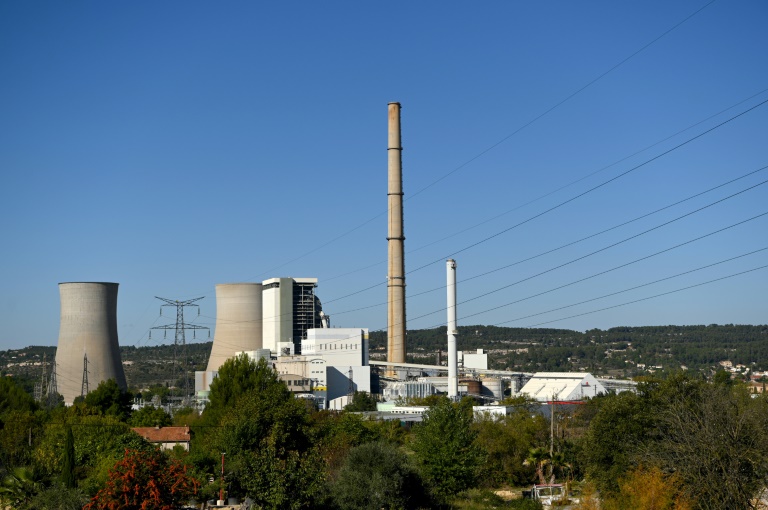The Gardanne smokestack is the highest in France at 295 metres (975 feet) but the mood at the power station beneath the once-proud chimney has reached an all-time low.
Gardanne is one of the last remaining French coal-fired stations. Ever since the government announced the closure of its coal plants three years ago to help meet climate goals, anger and despair has spread across this community of 20,000, half an hour’s drive northeast of Marseille.
Many have lost their jobs, and they are furious with the government, which they say is not helping them find a place in a post-coal future.
“What good is the ecological transition if it leads to mass unemployment?” asked Nadir Hadjali, boss of the hard-left CGT union at the power plant that went into operation in the 1950s.
– ‘Fighting for our jobs’ –
France has vowed to shut three of its four remaining coal plants by next year, and the last one in 2024 as it moves towards its goal of reaching carbon neutrality by 2050.
China, India and some European countries still rely heavily on coal for electricity, but France’s dependence on the highly polluting fossil fuel has been declining for decades, with nuclear power accounting for more than two-thirds of its electricity mix.
Still, about 1,400 jobs are — directly or indirectly — threatened by the last French closures, according to the environment ministry, including 220 at Gardanne, and the nearby Fos-sur-Mer port which handles coal imports for the plant.
“We’re fighting for our jobs, the power station will live,” said a banner put up at the site’s entrance by workers. But that wish has so far proved elusive.
When coal was definitively banned from the Gardanne plant in 2018, there was a plan to turn it into a biomass installation, generating power by burning wood pellets.
The experiment — already criticised by environmental groups — was suspended after just a month due to a conflict between management and workers over the social conditions of the transition.
Last month, the standoff reached a fever pitch when management accused the union of being behind what it said was an illegal occupation of the site by 80 hooded people.
The CGT insisted all it had done was “protect” the station, which it said had become unsafe since 98 of its 154 jobs were axed.
Site owners GazelEnergie — a subsidiary of Czech billionaire Daniel Kretinsky’s energy company EPH — in September presented a plan to turn it into a production site for green hydrogen and renewable synthetic fuels, creating 50 new jobs.
It has not given a timetable for the project, called “Hynovera”, but it has the backing of the central government in Paris and some local politicians.
Complementing biomass production, it would require an investment of 400 million euros ($460 million).
The CGT’s Hadjali, who has worked here for 22 years, said his union was “not against this or any other project, but we want to be certain that existing staff at the site will be offered those jobs”.
– ‘Eternal illusions’ –
Workers have come up with an alternative plan, consisting of building a plant for converting methane and hydrogen into gas, which they say would require 100 million euros of investment over two years.
But the local member of parliament, Francois-Michel Lambert of the opposition Liberte Et Territoires party, poured cold water on both ideas, calling them “eternal illusions”.
Lambert said that “the conversion will not take any of these forms”.
Biomass was not meeting stricter environmental norms, hydrogen production was already being handled elsewhere and as for the workers’ plan, Lambert said “the government doesn’t want to invest the money”.
Instead, the deputy said, the plant should be shut down and much-needed social housing built there instead.
Exhausted by the wait and the fight, some workers have walked away from the station.
One of them, who declined to be identified, told AFP that he had found a job at a green energy firm. However, he now has to drive 25 kilometres (15 miles) to work, with spiking fuel prices eating into his monthly pre-tax pay increase of 600 euros ($695).
While local politicians hold meeting after meeting in the hope of coming up with an idea for the plant, the workers blame President Emmanuel Macron’s government for closing the plant without offering them a viable alternative.
“They never thought this through,” said union boss Hadjali.









